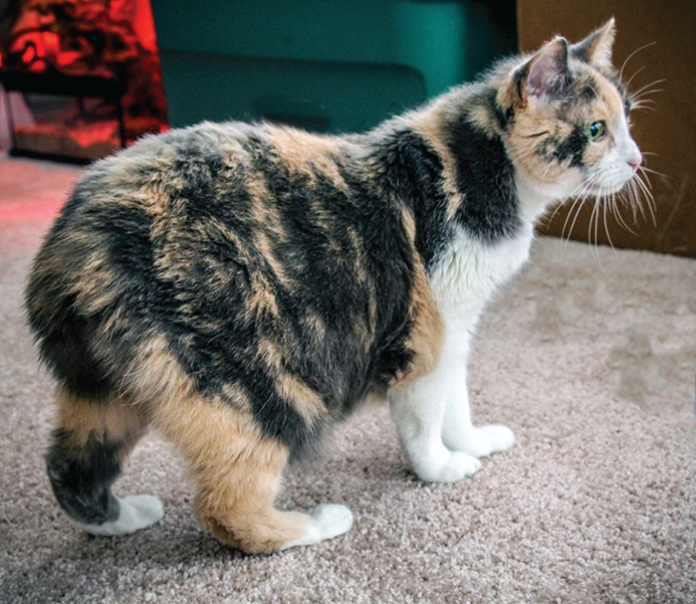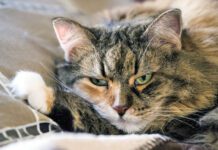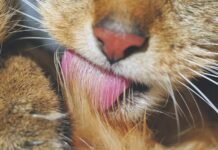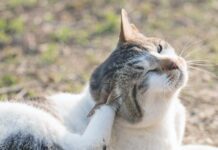Constipation is a relatively common problem in middle-aged to older cats. Male cats tend to be at a slightly higher risk. Causes can be as simple as dietary upset or a lack of water or can be due to tumors or infection (see sidebar).
Common Causes of Constipation
- Pelvic injury
- Joint pain
- Dietary upset
- Infection
- Nerve damage
- Stress
- Hairballs
- Indiscriminate eating causing blockage
- Intestinal and abdominal cancers
- Obesity
- Perineal hernias
- Intestinal intussusceptions
- Medications
- Electrolyte imbalances
- Dehydration
- Decreased colon motility
Most normal cats have one to three bowel movements per day. Learn what is normal for your cat. This can be a challenge in a multi-cat household, but you may find that cats have preferential litterboxes for eliminating, which can help you with “who did what.” Otherwise, if you notice there are fewer stools when you clean litterboxes, you may need to separate cats for a day to determine which cat may be ill.
If you notice your cat straining in the litterbox, your first concern should be urinary obstruction, which is an immediate veterinary emergency. If you see that there is plenty of wet litter but no fecal material, constipation is more likely. If your cat goes 48 hours without defecating, he needs veterinary attention.
Understanding Constipation
In a constipated cat, the colon—the section of the lower intestine that functions as a reservoir for undigested food, mucus, bacteria, and dead cells prior to evacuation—becomes impacted with feces that will not budge. Stool that is retained for too long can become hard and dry and difficult to move.
A constipated cat will usually strain to defecate and may cry out while trying to pass hard stool. Sometimes a cat will pass a small amount of liquid stool that gets past the hardened fecal material. Very hard stools with blood are a telltale sign of constipation. Some cats will start to avoid the litterbox since they associate it with pain, so watch for straining behaviors at any time. Over time, constipated cats may become lethargic, depressed, and may vomit.
Diagnostics
Diagnosing constipation, obstipation (severe chronic constipation), or megacolon requires a trip to the veterinarian. Your veterinarian will palpate your cat’s abdomen, attempt a gentle rectal examination, and may take radiographs to see where the blockage is and how severe it is. Abdominal ultrasonography may be used. Urine and bloodwork may be evaluated to rule out underlying health problems and determine if your cat is dehydrated.
Treatment
Mild constipation, if caught early, often can be successfully treated. Treatment normally starts with hydration, which may include intravenous (IV) fluids. Milder cases may recover with subcutaneous (under the skin) fluids.
Oral laxatives, which draw water into the colon and soften the stool, can be beneficial in some cats. Others may need a pediatric or warm-water enema to soften the stool so that it can pass. Sometimes, gentle massage is required to stimulate elimination and/or to break up firm masses in the abdomen. Care must be taken to prevent any tears of the intestines. Some cats may need to be sedated so that hard fecal material can be manually removed through the rectum.
Homework
Once your cat is home, you will need to maintain your cat’s hydration with clean, fresh water available 24/7 (wash the water bowl regularly). Some cats will drink more if you leave a faucet on with a slow drip or use a commercial cat fountain.
Canned foods provide more water than dry kibble, so using these can be helpful. If you are feeding kibble, you can add low sodium broth (no onion or garlic flavoring, please!), water from canned tuna, or warm water.
Small amounts of insoluble fiber also can help. Your veterinarian may suggest psyllium (Metamucil), plain canned pumpkin, coarse wheat bran, or a prescription diet that can aid in preventing constipation. Some cats do best with high fiber diets (more than 20% fiber as fed), which can stimulate the colonic smooth muscles to contract. These can act as “bulk” laxatives.
Since being overweight predisposes cats to constipation, regular exercise and weight loss are important for constipated cats that are overweight or obese. Try to schedule play/exercise time every day for your cat (who doesn’t enjoy playing with their cat?). Work with your veterinarian to develop a healthy weight-loss program, and consider downloading Purrfect Weight, a feline weight-loss iPhone app recently released by the Cornell Feline Health Center, if you have an iPhone. This can be found in the App Store at https://tinyurl.com/Cornell-Purrfect-Weight.
If hairballs are the cause of the blockage, groom your cat more frequently and discuss the possibility of shaving a long-haired cat with your veterinarian if she resists grooming.
Lastly, your veterinarian may suggest the routine use of medications that increase intestinal motility or laxatives. Follow instructions exactly, and do not give one cat’s medication to another cat without veterinary approval.

Photography BiancaGrueneberg | iStock Photo
Ensure Adequate Hydration
Dehydration can cause hard stools. Your cat should always have plenty of fresh, clean water available. If you have several cats, provide multiple water bowls so no cat can control this resource and prevent other cats from drinking. Older cats may need water bowls moved to accommodate changes in mobility. Watch for oral diseases such as ulcers, periodontal disease, or broken teeth that may cause drinking water to be painful.
Serious Cases
Cats with obstipation or megacolon (a very dilated, flaccid colon with poor motility) usually require more intensive therapy. Obstipated cats often have some permanent loss of intestinal function. If the condition is chronic, the colon will usually dilate or enlarge, leading to megacolon and/or secondary nerve dysfunction. At this point, the cat usually becomes unable to evacuate its bowels, which can cause bacteria to leak from the bowels to the bloodstream (septicemia), a potentially fatal condition.
With megacolon, the affected intestinal wall may develop ulcers and be inflamed, increasing the risk of septicemia and perforation, which can be fatal. Surgery to remove the affected section of the colon is usually recommended in extreme cases.
Post operatively, cats that have such surgery may suffer from diarrhea for up to six weeks. The good news is that anal tone and reflexes are not commonly affected, so long-term incontinence is not common.
What You Can Do
- Learn your cat’s normal bowel habits
- Normal feline stools are soft (but not liquid), brownish, well formed, and moist on the outside
- Keep your cat at a healthy weight
- Watch for straining
- Know that vomiting can be a sign of constipation
- Keep a close watch if you see diarrhea or small amounts of liquid stool in the litterbox
- Keep fresh, clean water in easily accessible areas
- Consider adding wet food to your cat’s diet




